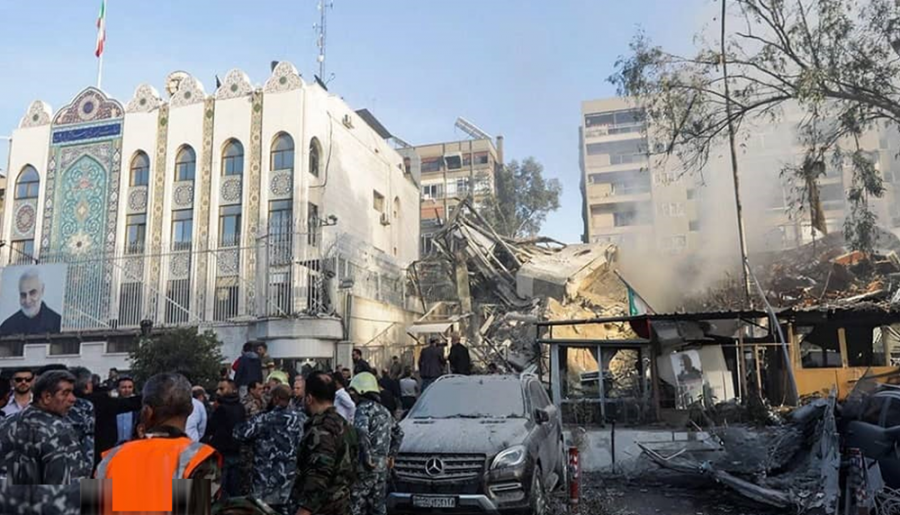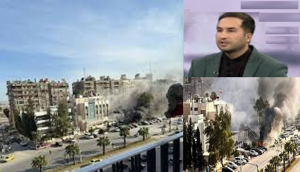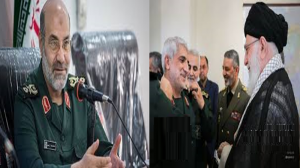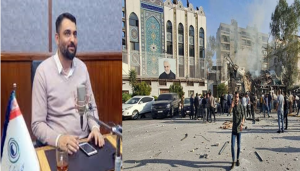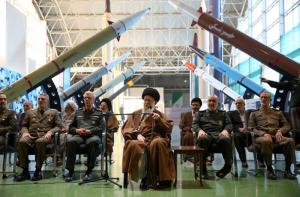
(Video) Iran’s Regime Faces Serious Domestic Challenges Following Damascus Embassy Strike
Mohammad Reza Zahedi had reportedly served as head of Syrian and Lebanese divisions of the IRGC’s foreign special operations wing the Quds Force, until 2016.
PARIS, FARANCE, April 8, 2024 /EINPresswire.com/ -- The National Council of Resistance of Iran (NCRI) Foreign Affairs Committee in an article published that authorities in Iran held funeral services on Wednesday for two generals from the Islamic Revolutionary Guard Corps who had been killed the previous day in an apparent Israeli strike on the Iranian embassy in Damascus. Meanwhile, the official death toll from that strike rose to at least 16, including several other Iranians and an officer from the regime’s Lebanese militant proxy, Hezbollah.
While the Iranian regime celebrated the two deceased generals, international media provided additional information about their backgrounds and roles both within the IRGC and in Syria, where the hardline paramilitary group was instrumental in preserving the government of Bashar al-Assadi through a years-long, multilateral civil war.
Brigadier General Mohammad Reza Zahedi had reportedly served as head of the Syrian and Lebanese division of the IRGC’s foreign special operations wing, the Quds Force, until 2016.
He was killed in Tuesday’s strike alongside his deputy, General Mohammad Hadi Hajriahimi. While Hezbollah provided little information about its own eliminated member Hussein Youssef, it did publicly credit Zahedi with a crucial role in helping to “develop and advance the work” of that group within Lebanon.
Zahedi’s broader role in the IRGC involved the facilitation of weapons transfers and associated military support from Tehran to its militant proxies, as well as assistance in creating strategies for the regime’s so-called “Axis of Resistance.”
Zahedi’s presence in Damascus implies that other IRGC officers had already assumed the roles he had previously played inside Iran, but reports indicate that he had indeed been heavily involved in the suppression of domestic dissent, including during the nationwide uprising of November 2019 which led to roughly 1,500 Iranian civilians being shot dead by the Islamic Revolutionary Guards Corps (IRGC).
Three years earlier, he appeared in a video shot by the IRGC which depicted joint exercises between it and the police and showcased both the strategies and the views of paramilitary operatives toward public protests and expressions of dissent.
The IRGC’s function both as a tool of domestic repression and as a promoter of international terrorism has fueled calls for it to be designated by Western governments as a foreign terrorist organization.
While various regime officials have initiated harsh rhetoric regarding retaliating against the United States and Israel, the regime’s inaction in response to all previous incidents has caused significant concern and frustration among many internal elements of the regime.
Nasser Torabi, who has been designated as an expert on West Asian affairs by state television, said, “My point is that when our enemy strikes us to such an extent that this issue becomes the headline in the global public opinion, everyone is watching and monitoring us. The response must be at the same level. If you say I hit somewhere, sometimes. they are the ones that hit. This will at least make you lose the game in your public perception. Of the four effects that I mentioned earlier, one is the internal security domain. One of them is the economic domain. It puts you in a medium and long-term situation. It will have an effect of frustration among our internal forces.”
Criticizing the regime’s official lip service about the Damascus strike, Jalal Rashidi Kuchi, a member of the regime’s parliament, said, “Delay, patience, and hesitation in a decisive and similar response to the Zionist regime’s military attack on Iranian soil, under any pretext, is tantamount to a severe blow to Iran’s great honor and dignity.”
Mohammad Taghi Aghayan, another strategic affairs expert, appeared on state television on April 1, stating, “They killed martyr Soleimani, we said we would take harsh revenge. Instead, they took revenge. Further, they killed Seyed Razi and we still vowed to take a harsh revenge. They killed Mr. Arouri. They targeted Hashd al-Shaabi officials. They targeted Hezbollah officials, but we still talked about harsh revenge and patience. We claimed that “we will hit where you expect the least.” I have difficulty understanding when and where they will stop expecting so that our revenge might occur!”
Therefore, the clerical regime, which viewed itself as the primary beneficiary of the Middle East conflict, now faces a critical decision point. Failing to respond adequately or reacting insufficiently will exacerbate its internal morale crisis and strengthen the increasingly vocal dissent.
On the other hand, any response risks escalating the situation to the point of a full-scale war, endangering the regime’s survival.
The war in Gaza is rapidly entering its seventh month. Considered one of the most tragic contemporary events, seemingly the international community is about to see the Iranian regime’s hands behind this event. While calls to counter the “head of the snake” in Tehran have increased, the question is why and how it should be dealt with.
Since its foundation, the Iranian regime has found salvation in exporting internal crises abroad. Facing a restive and vibrant society, Iran’s religious fascism has been orchestrating wars and funding terrorist groups.
The regime’s founder, Ruhollah Khomeini, provoked and dragged his feet with the Iran-Iraq war for eight years, using it as a cover to oppress society.
He sent millions to the front lines, while his commanders used hundreds of thousands of teenagers and youth as canon fodder and human waves. Using the momentum, Khomeini’s henchmen sent tens of thousands of dissidents to the gallows. Therefore, it is safe to say that the bloodthirsty tyrant destroyed or at least crippled a generation.
Rattled with several uprisings, the Iranian regime faces a vibrant and restive society. In addition, the ruling theocracy has to deal with the growing threat of an organized opposition within Iran that has kept the fire of resistance ablaze despite systematic oppression.
Iran’s economy is in ruins, and state media keep warning about society’s reaction to the record-high inflation, unemployment, and misery index.
But does firmly dealing with the head of the snake in Iran mean war?
First, Western governments have proven they are more for a costless approach toward the regime. Four decades of appeasement toward the regime and believing in the myth of moderation are testaments to this fact.
There have been several operations against the Iranian regime’s interests and proxies in neighboring countries, but they were too late and limited and should have happened sooner.
For decades, the Iranian Resistance and people have called for regime change, considering it the only option to effectively curb terrorism globally. This could and should happen only by the Iranian people and their organized opposition. How is that possible?
In reaction, the Iranian Resistance repeatedly called out the regime’s warmongering. It was Massoud Rajavi, the Iranian Resistance’s leader who first called this regime “the head of the snake.”
And Mrs. Maryam Rajavi, the president-elect of the National Council of Resistance of Iran (NCRI) warned the international community soon after the Second Gulf War that Tehran’s danger of terrorism is far more devastating than its nuclear weapons project.
It seems that following Tehran and its proxies’ actions in recent months, especially Houthis in Yemen damaging the maritime flow and commerce in the Red Sea, the international community is leaning toward dealing with “the head of the snake.”
Meanwhile, some so-called “experts” and regime apologists claim targeting the regime can increase the tensions in the Middle East. Those promoting this false notion try to illustrate the regime as a regional power, which is far from reality.
If you wish to receive the NCRI weekly Newsletter, please use the following link to subscribe: https://bit.ly/3SMgEla.
Shahin Gobadi
NCRI
+33 6 61 65 32 31
email us here
For decades, the Iranian Resistance and people have called for regime change, considering it the only option to effectively curb terrorism globally.
EIN Presswire does not exercise editorial control over third-party content provided, uploaded, published, or distributed by users of EIN Presswire. We are a distributor, not a publisher, of 3rd party content. Such content may contain the views, opinions, statements, offers, and other material of the respective users, suppliers, participants, or authors.

